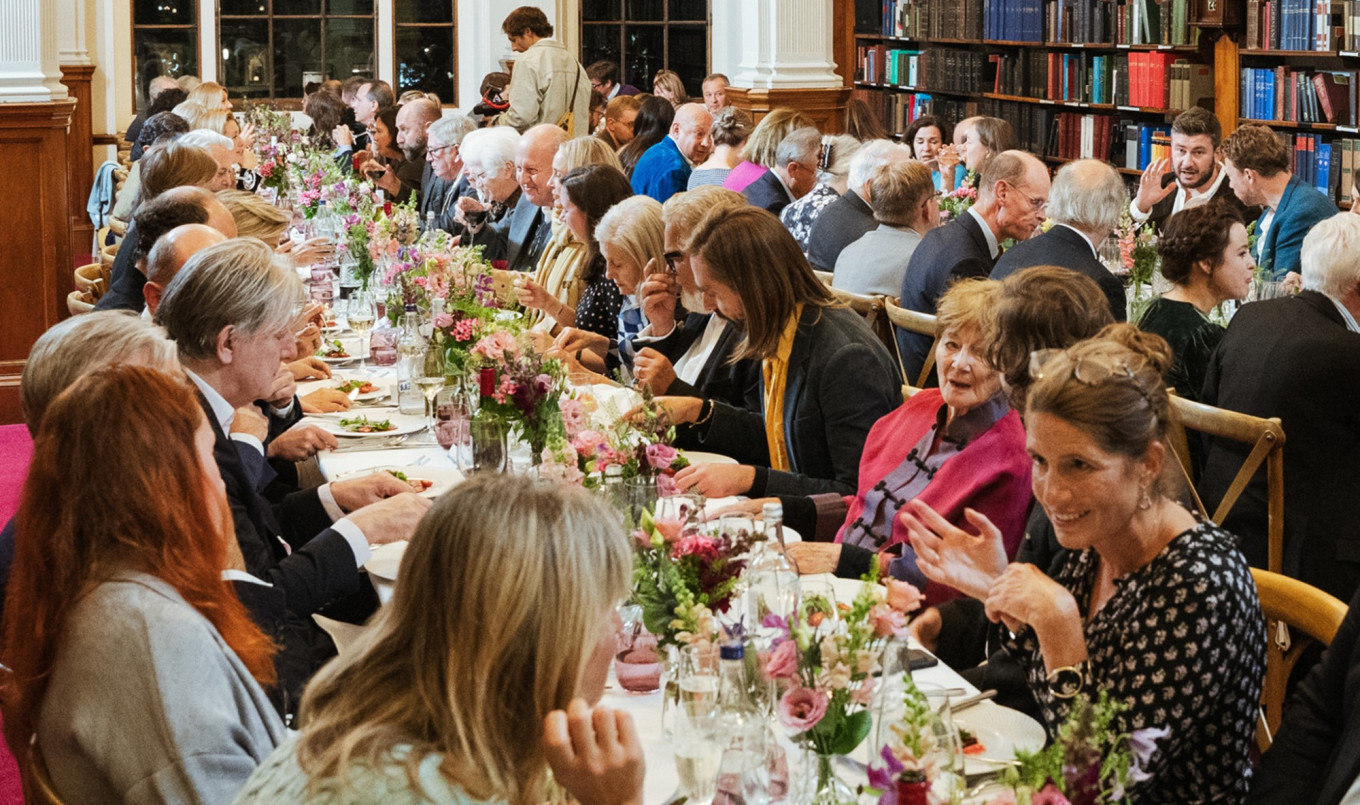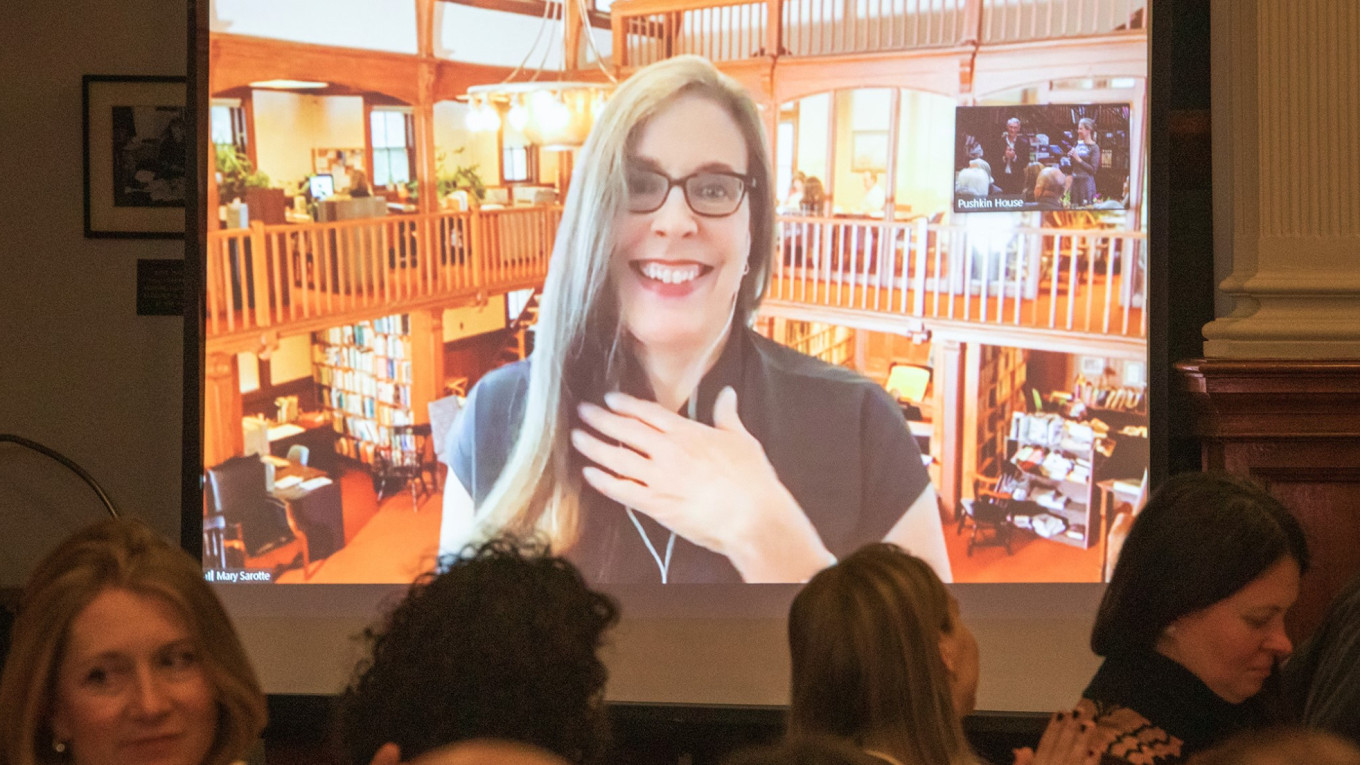On Sept. 28 at a gala ceremony in the London Library, the Pushkin House Book Prize for 2022 was awarded to Mary E. Sarotte for “Not One Inch: America, Russia, and the Making of Post-Cold War Stalemate.”
“Not One Inch” was one of ten books nominated for this year’s prize. It is an in-depth and revealing account of America's relations with the new post-Cold War democracies of East and Central Europe, with its older European allies, and, in particular with Russia — a relationship that went badly awry and sowed the seeds of the tensions that shape today's world.
In her acceptance speech Prof. Sarotte said, “When I was researching and writing the book, I often encountered skepticism about the topic. Repeatedly I heard that Russia was no longer of interest and that readers would not want to read my book. I persisted in my research because I felt strongly that it is essential to understand the history of Western interaction with Russia. I am grateful to Yale University Press for its support in bringing my work to a wider audience and, once again, to Pushkin House for this vote of confidence."
Ekaterina Schulmann, spokesperson for 2022 judges, said that “Mary Sarotte’s book presents an in-depth documentation and compelling narrative of East-West diplomacy and relationships. The story that she tells is at once historically significant and uncomfortably near. In 2022, it sometimes reads like one of those works that describe the events preceding World War I… The significance of Sarotte’s voice and her careful analysis gives us readers an opportunity to at least begin to understand how we got to where we find ourselves now.”
Everyone connected with the Book Prize noted the special significance of the books nominated this year and the winning volume. Andrew Jack, founder of the prize, said, “Never in the history of the prize has high quality writing to understand Russia been more important - or better supplied than in this year’s offerings.”
Marc Polonsky, Chair of the Board of Trustees at Pushkin House, noted the crucial importance of “a deep understanding and proper analysis of Russia in all its complexity — both its past and present.” And Douglas S. Smith, who with his wife Stephanie Ellis-Smith, helps fund the prize, said: “Mary Sarotte’s ‘Not One Inch’ is not only the book for our turbulent times, but will be long read by everyone seeking to understand the origins of the post-Cold War world. It’s irreplaceable work.”
The judges also wished to recognize “In Memory of Memory” written by Maria Stepanova and translated by Sasha Dugdale, a beautifully reflection on the Soviet experience of families and the mysterious power of memory.
This year the judges were Evgenia Arbugaeva, photographer; Archie Brown, Emeritus Professor of Politics at Oxford University and the author of many books including "The Human Factor: Gorbachev, Reagan, and Thatcher and the End of the Cold War," which won the 2021 Pushkin House Book Prize; Dmitry Glukhovsky, a multilingual journalist and author; Ekaterina Schulmann, political scientist and an associate professor; Bosch Academy Richard von Weizsäcker fellow; and Baroness Deborah Bull, writer, broadcaster, cultural commentator and Crossbench Peer in the House of Lords.

At the ceremony the Pushkin House reiterated its commitment to support thinkers and creative people who can contribute to a richer understanding of the world after Feb. 24, 2022. For that reason, in part, the Book Prize committee considered ten works this year instead of the six books they have shortlisted in the past.
The Pushkin House Book Prize of £10,000 is awarded every year to the best book of non-fiction about and/or from Russia published in the preceding year.
Prof. Sarotte concluded her acceptance speech with a strong endorsement of the Pushkin House and its activities. “I believe that the work of Pushkin House in the service of international dialogue is now more essential than ever, given the immense tragedy of the war in Ukraine,” she said. “The mission of Pushkin House is to provide an in-depth understanding of Russia, something that could not be a more urgent need at this critical time. It is an honor to receive this distinction from such an essential institution, whose work will only continue to gain in relevance.”
A Message from The Moscow Times:
Dear readers,
We are facing unprecedented challenges. Russia's Prosecutor General's Office has designated The Moscow Times as an "undesirable" organization, criminalizing our work and putting our staff at risk of prosecution. This follows our earlier unjust labeling as a "foreign agent."
These actions are direct attempts to silence independent journalism in Russia. The authorities claim our work "discredits the decisions of the Russian leadership." We see things differently: we strive to provide accurate, unbiased reporting on Russia.
We, the journalists of The Moscow Times, refuse to be silenced. But to continue our work, we need your help.
Your support, no matter how small, makes a world of difference. If you can, please support us monthly starting from just $2. It's quick to set up, and every contribution makes a significant impact.
By supporting The Moscow Times, you're defending open, independent journalism in the face of repression. Thank you for standing with us.
Remind me later.






